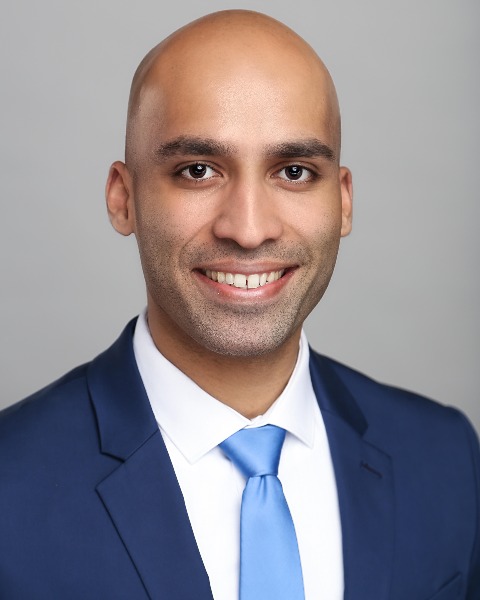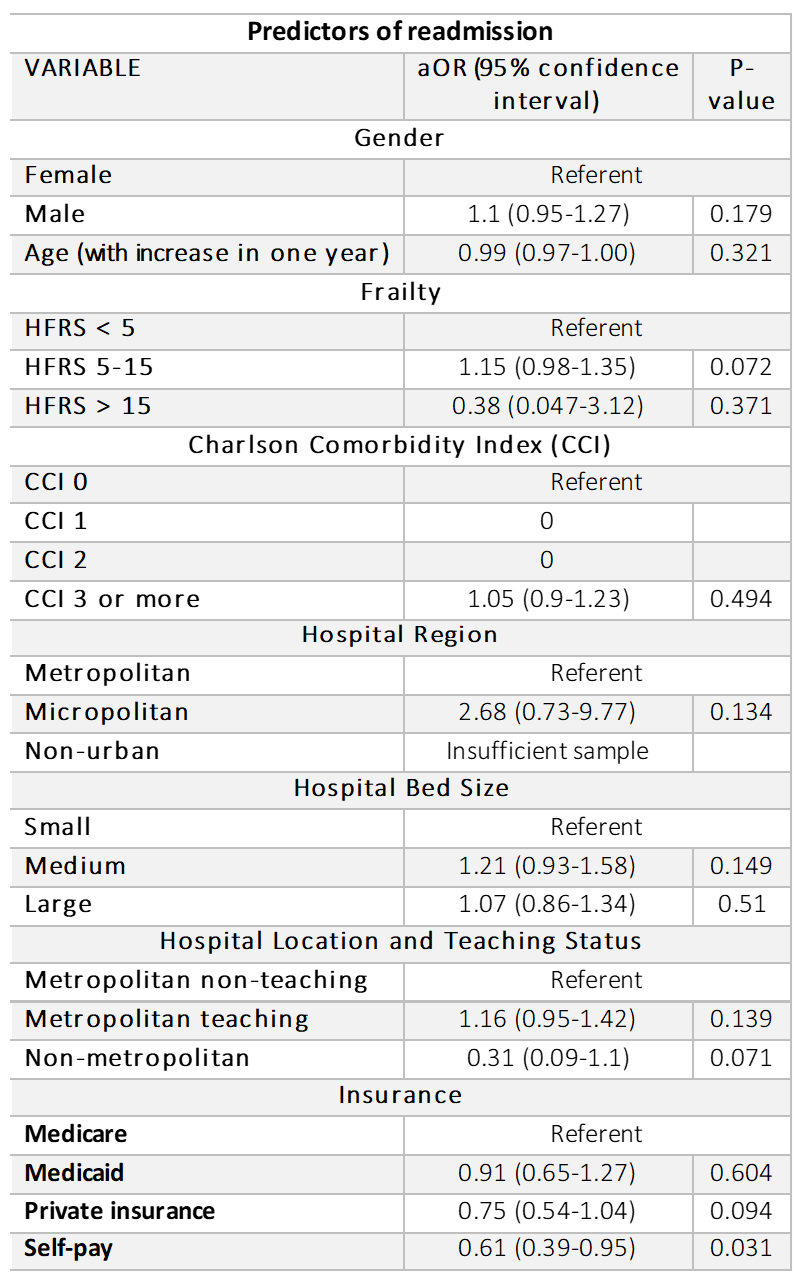Monday Poster Session
Category: Colon
P2407 - Trends and Predictors of Readmission in Early-Onset Colorectal Cancer
Monday, October 27, 2025
10:30 AM - 4:00 PM PDT
Location: Exhibit Hall

Clive J. Miranda, DO, MSc
CHI Health Creighton University Medical Center
Omaha, NE
Presenting Author(s)
Clive J. Miranda, DO, MSc1, Bhanu Pinnam, MD2, Daniel Guifarro, MD2, Mohammed Qasswal, MD3, Farhan Azad, DO4, Alexander M. Carlson, DO5, Sasikanth Ravi, DO6, Aun R. Shah, MBBS, MRCP1
1CHI Health Creighton University Medical Center, Omaha, NE; 2John H. Stroger, Jr. Hospital of Cook County, Chicago, IL; 3Creighton University Medical Center, Omaha, NE; 4INOVA Fairfax Hospital, Falls Church, VA; 5University at Buffalo, Buffalo, NY; 6Saint Peter's University Hospital, New Brunswick, NJ
Introduction: Early-onset colorectal cancer (EOCRC), defined as colorectal cancer (CRC) diagnosed before the age of 50, has been steadily increasing in incidence worldwide. In the United States, EOCRC accounts for 11% of all colon cancer and 15% of all rectal cancer diagnoses with incidence rates increasing by 1.1% annually for individuals below age 50. The diagnoses appear to favor males over females with certain ethnic groups, such as Arabs, showing higher incidence rates. EOCRC presents at more advanced stages and with more aggressive histologic features. Despite this, patients frequently have better stage-adjusted survival rates as compared to their late-onset colorectal counterparts. Our study aims to look at readmission rates in EOCRC and identify focus-areas in the process that can help reduce healthcare costs and optimize clinical care for these patients.
Methods: Using the National Readmissions Database (NRD), we identified all index admissions between 2016-2021 of patients aged 40 years or younger diagnosed with CRC. Demographic and admitting data were analyzed including age, sex, Charlson Comorbidity Index (CCI), patient disposition, and hospital region, bed size, location and teaching status. Primary outcomes were 30-day readmission rates. Secondary outcomes included gender, frailty, insurance status, and hospital region/status.
Results: A total of 10,710 index admissions with a diagnosis of CRC younger than age 40 years were identified. 5917 (55%) were male and mean age was 34.3 years +/- 34.1-34.5 standard error. Out of these, 10,413 (97%) were discharged alive. Readmissions occurred in 2073 (20%) of these patients with a mean age of 34.1 years +/- 33.8-34.4 standard error and 57% of them being male. Most readmissions occurred in hospitals located in metropolitan regions (96%), teaching hospitals (80%), and hospitals with higher numbers of beds (64%). There was no statistically significant difference in readmission rates when accounting for sex, frailty index, hospital region/location, or CCI. However, compared to Medicare, self-pay was associated with a lower readmission rate after adjustment of variables, and this was statistically significant. The majority of readmitted patients were discharged (64%). The mortality rate for index admissions for CRC was 2.8% whereas it rose to 5.5% for readmissions.
Discussion: Mortality rate for EOCRC readmissions is higher than those of index admissions and self-pay is associated with lower readmission rates for EOCRC compared to Medicare.

Figure: Hospitalization characteristics of index admissions and readmissions for early-onset colorectal cancer.

Figure: Predictors of readmission in patients with early-onset colorectal cancer.
Disclosures:
Clive Miranda indicated no relevant financial relationships.
Bhanu Pinnam indicated no relevant financial relationships.
Daniel Guifarro indicated no relevant financial relationships.
Mohammed Qasswal indicated no relevant financial relationships.
Farhan Azad indicated no relevant financial relationships.
Alexander Carlson indicated no relevant financial relationships.
Sasikanth Ravi indicated no relevant financial relationships.
Aun Shah indicated no relevant financial relationships.
Clive J. Miranda, DO, MSc1, Bhanu Pinnam, MD2, Daniel Guifarro, MD2, Mohammed Qasswal, MD3, Farhan Azad, DO4, Alexander M. Carlson, DO5, Sasikanth Ravi, DO6, Aun R. Shah, MBBS, MRCP1. P2407 - Trends and Predictors of Readmission in Early-Onset Colorectal Cancer, ACG 2025 Annual Scientific Meeting Abstracts. Phoenix, AZ: American College of Gastroenterology.
1CHI Health Creighton University Medical Center, Omaha, NE; 2John H. Stroger, Jr. Hospital of Cook County, Chicago, IL; 3Creighton University Medical Center, Omaha, NE; 4INOVA Fairfax Hospital, Falls Church, VA; 5University at Buffalo, Buffalo, NY; 6Saint Peter's University Hospital, New Brunswick, NJ
Introduction: Early-onset colorectal cancer (EOCRC), defined as colorectal cancer (CRC) diagnosed before the age of 50, has been steadily increasing in incidence worldwide. In the United States, EOCRC accounts for 11% of all colon cancer and 15% of all rectal cancer diagnoses with incidence rates increasing by 1.1% annually for individuals below age 50. The diagnoses appear to favor males over females with certain ethnic groups, such as Arabs, showing higher incidence rates. EOCRC presents at more advanced stages and with more aggressive histologic features. Despite this, patients frequently have better stage-adjusted survival rates as compared to their late-onset colorectal counterparts. Our study aims to look at readmission rates in EOCRC and identify focus-areas in the process that can help reduce healthcare costs and optimize clinical care for these patients.
Methods: Using the National Readmissions Database (NRD), we identified all index admissions between 2016-2021 of patients aged 40 years or younger diagnosed with CRC. Demographic and admitting data were analyzed including age, sex, Charlson Comorbidity Index (CCI), patient disposition, and hospital region, bed size, location and teaching status. Primary outcomes were 30-day readmission rates. Secondary outcomes included gender, frailty, insurance status, and hospital region/status.
Results: A total of 10,710 index admissions with a diagnosis of CRC younger than age 40 years were identified. 5917 (55%) were male and mean age was 34.3 years +/- 34.1-34.5 standard error. Out of these, 10,413 (97%) were discharged alive. Readmissions occurred in 2073 (20%) of these patients with a mean age of 34.1 years +/- 33.8-34.4 standard error and 57% of them being male. Most readmissions occurred in hospitals located in metropolitan regions (96%), teaching hospitals (80%), and hospitals with higher numbers of beds (64%). There was no statistically significant difference in readmission rates when accounting for sex, frailty index, hospital region/location, or CCI. However, compared to Medicare, self-pay was associated with a lower readmission rate after adjustment of variables, and this was statistically significant. The majority of readmitted patients were discharged (64%). The mortality rate for index admissions for CRC was 2.8% whereas it rose to 5.5% for readmissions.
Discussion: Mortality rate for EOCRC readmissions is higher than those of index admissions and self-pay is associated with lower readmission rates for EOCRC compared to Medicare.

Figure: Hospitalization characteristics of index admissions and readmissions for early-onset colorectal cancer.

Figure: Predictors of readmission in patients with early-onset colorectal cancer.
Disclosures:
Clive Miranda indicated no relevant financial relationships.
Bhanu Pinnam indicated no relevant financial relationships.
Daniel Guifarro indicated no relevant financial relationships.
Mohammed Qasswal indicated no relevant financial relationships.
Farhan Azad indicated no relevant financial relationships.
Alexander Carlson indicated no relevant financial relationships.
Sasikanth Ravi indicated no relevant financial relationships.
Aun Shah indicated no relevant financial relationships.
Clive J. Miranda, DO, MSc1, Bhanu Pinnam, MD2, Daniel Guifarro, MD2, Mohammed Qasswal, MD3, Farhan Azad, DO4, Alexander M. Carlson, DO5, Sasikanth Ravi, DO6, Aun R. Shah, MBBS, MRCP1. P2407 - Trends and Predictors of Readmission in Early-Onset Colorectal Cancer, ACG 2025 Annual Scientific Meeting Abstracts. Phoenix, AZ: American College of Gastroenterology.
